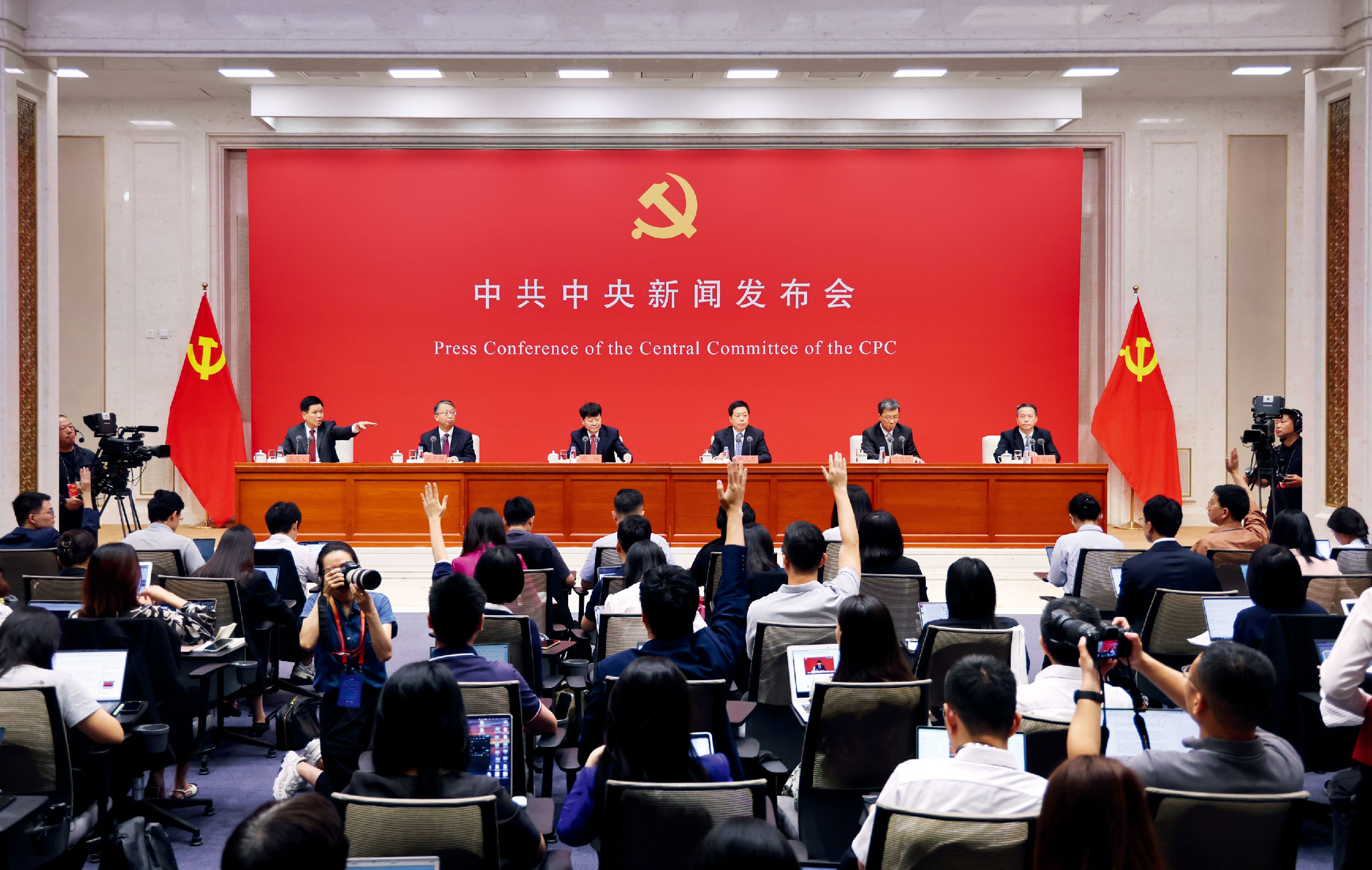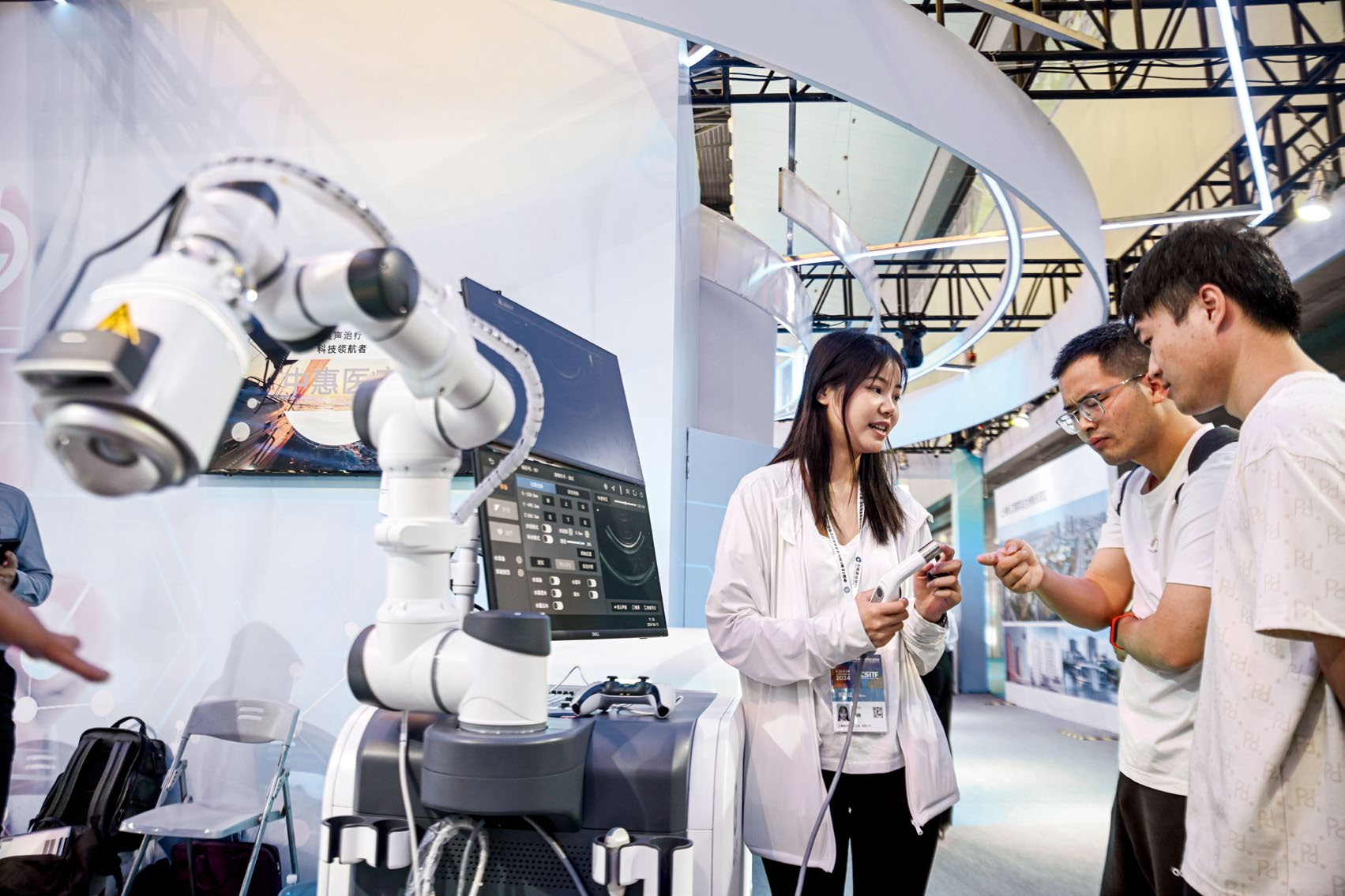Reform resolution is most important outcome of latest CPC plenum: official

The Central Committee of the Communist Party of China (CPC) holds a press conference on the guiding principles from the third plenary session of the 20th CPC Central Committee, July 19, 2024. [Photo by Yang Kejia/China News Service]
The adoption of a reform resolution is the most important outcome of the third plenary session of the 20th Communist Party of China (CPC) Central Committee, a senior official said on July 19, 2024.
Tang Fangyu, deputy head of the CPC Central Committee Policy Research Office, made the remarks at a press conference on the guiding principles from the just-concluded plenum.
Promoting Chinese modernization faces many complex issues, necessitating further deepening reform comprehensively to better adapt the relations of production to the productive forces, the superstructure to the economic base, and national governance to social development, Tang said.
The resolution, with economic structural reform as the spearhead, comprehensively plans reforms in various fields and aspects, Tang said, adding that the resolution puts forward more than 300 important reform measures, all of which involve reforms on the levels of systems, mechanisms and institutions.
China will accelerate efforts to build a high standard market system, which is a major reform task for the country, said Han Wenxiu, executive deputy director of the Office of the Central Committee for Financial and Economic Affairs.
Efforts will be made to build a unified national market, including the development of a unified urban-rural construction land market, a nationwide integrated technology and data market, and a unified national electricity market.
The country will improve the market system and rules for production factors such as labor, capital, land, knowledge, technology, management and data, Han told the press.
The systems underpinning the market economy will be refined, including optimizing the systems for property rights protection, information disclosure, market access, bankruptcy exit and credit supervision.
To strengthen its macroeconomic governance, China looks to improve the fiscal relations between central and local governments, and research will be conducted to make China's tax system compatible with new business models, Han added.
China will also enhance policy support for childbirth to foster a fertility-friendly society, as part of its efforts to ensure and improve the people's wellbeing, according to Han.
He said the country will make institutional improvements to facilitate high-quality and full employment, and enhance the development of old-age care industry.
In promoting high-level opening-up, China will expand unilateral opening-up to the least-developed countries, and open to the rest of the world its goods, service, capital and labor markets in an orderly way, Han said.
Improvements will also be made on relevant systems to make it more convenient for people from overseas to live, seek medical services and make payments in China.
Firms to get support for future tech, products

People watch a medical robot on display at the 10th China (Shanghai) International Technology Fair in east China's Shanghai, June 13, 2024. [Photo by Bao Gansheng/China News Service]
China will encourage companies and institutions to develop core technologies and landmark products in future-oriented and strategic emerging industries, to drive industrial upgrade and promote new industrialization, the country's top industrial regulator said on July 5, 2024.
Jin Zhuanglong, minister of industry and information technology, said accelerated efforts will be made to develop future-oriented industries, especially humanoid robots, brain-computer interfaces, the metaverse, the next generation of the internet, 6G, quantum technology, atomic-level manufacturing, and deep sea and aerospace.
"A series of research projects will be implemented to make breakthroughs on core technologies, develop landmark products, and establish incubators, related to the above future-oriented industries," Jin said at a news conference of the State Council Information Office on July 5.
He said the nation will also step up efforts to drive businesses in strategic emerging industries, which accounted for about 13% of China's gross domestic product last year and boast significant growth potential in the future.
The senior official highlighted the importance of some critical strategic emerging industries, such as new materials, artificial intelligence, intelligent connected new energy vehicles, new energy storage, hydrogen energy biomanufacturing, commercial aerospace and the low-altitude economy.
"China will make greater efforts to cultivate leading companies with strong ecosystems related to such strategic emerging industries, and will strive to build more new pillar industries that can drive industrial upgrades," he added.
In May, China's industrial output — a gauge of activity in the manufacturing, mining and utilities sectors — grew by 5.6% year on year, according to the National Bureau of Statistics.
Fixed-asset investment — a gauge of expenditures on items including infrastructure, property, machinery and equipment — also increased by 4% year on year in the January–May period.
Jin said that the country will "further expand effective investment in manufacturing" and implement detailed plans for equipment upgrades in the industrial sector to promote the renewal of equipment.
China is currently promoting the upgrade of the industrial equipment. The country aims for a growth of over 25% in industrial equipment investment by 2027 compared to the level in 2023.
"The country will also leverage funds, including manufacturing transformation and upgrading fund, integrated circuit fund, as well as small and medium-sized enterprise development fund, to invest in more manufacturing sectors, and guide social capital to invest in some key areas and weak links in the construction of a modern industrial system," he added.
Investment in industrial equipment accounts for over 70% of total equipment investment in the country, and the annual scale of equipment renewal in the industrial sector is around 4 trillion yuan (553 billion U.S. dollars).
The nation is also hoping to achieve a digitalization rate of over 90% for research and development design tools in major industrial enterprises, and the usage rate of computer numerical control exceeding 75% for key processes in them.

